 Operation and Maintenance
Operation and Maintenance
 Linux Operation and Maintenance
Linux Operation and Maintenance
 What is the command to run sql file in linux
What is the command to run sql file in linux
What is the command to run sql file in linux
The command to run a sql file on Linux is "psql -f test.sql". The method for running a sql script on Linux is: 1. Use the shell tool to log in to the server where postgresql is installed; 2. Edit the content of the sql script; 3. . Execute the "test.sql" script through the "psql -f test.sql" command.

#The operating environment of this tutorial: linux5.9.8 system, Dell G3 computer.
What is the command to run sql file on Linux?
The specific steps for running sql scripts on Linux are as follows:
1. Use the shell tool to log in to the server where postgresql is installed, switch to the postgres user, the default operating user of postgresql, the command is :su - postgres, check that the current path is /var/lib/psql, create a test.sql script file, the command is: vim test.sql.
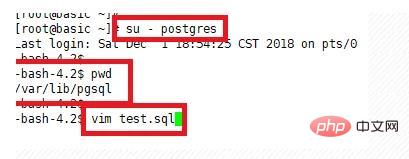
2. The content of the sql script is: create table test (id int not null primary key,name text);insert into test valus(1, 't1');
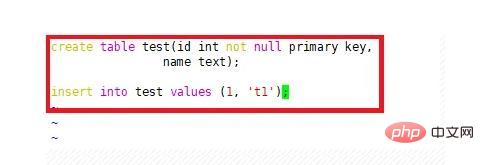
3. Execute the test.sql script, the command is: psql -f test.sql
This is because postgresql is installed on this machine, in the first step We switched to the postgres user, so the default is the postgres user to operate here, without bringing the user name and password. The execution results are as follows. You can see two prompts:
create table
insert 0 1
After the execution is completed, we log in to the database and the command is: psql
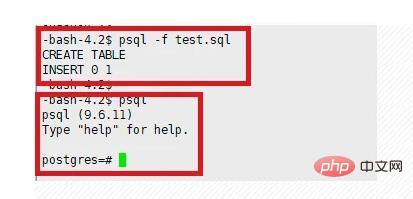
4. After entering the psql interactive command line, we execute two view commands:\d
You can see that the table test has indeed been created successfully, and then execute the command: \d test
You can see that the fields in the table are id and name, which are the same as the content in our creation statement, indicating that the first statement was executed successfully.
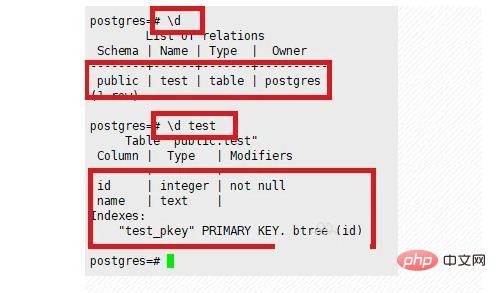
5. Check the data in the table. The command is: select * from test;
The displayed value is 1, t1, indicating that the second item is executed. The statement is also executed successfully, indicating that the test.sql script is executed successfully.
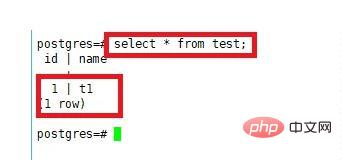
6. The default is postgres user. The local operation is, no user and password are required. Now let’s try to operate postgresql on the remote linux server, that is to say, execute A local script file that creates the table on the remote server. As shown in the figure below, the command is: psql -U test1 -h 192.168.1.194 -f test.sql, enter the password of the corresponding user.
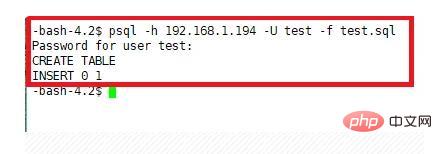
7. Log in to this remote server. The command is: psql -U test -h 192.168.194
Execute the view command: \d,\ d test
Finally query the database: select * from test; the results are consistent with the above.
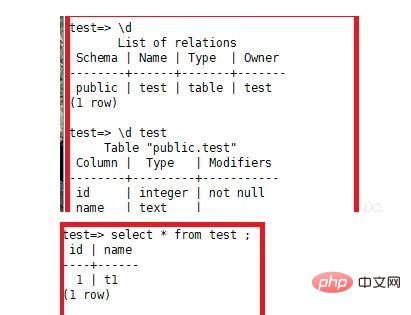
Recommended study: "Linux Video Tutorial"
The above is the detailed content of What is the command to run sql file in linux. For more information, please follow other related articles on the PHP Chinese website!

Hot AI Tools

Undresser.AI Undress
AI-powered app for creating realistic nude photos

AI Clothes Remover
Online AI tool for removing clothes from photos.

Undress AI Tool
Undress images for free

Clothoff.io
AI clothes remover

AI Hentai Generator
Generate AI Hentai for free.

Hot Article

Hot Tools

Notepad++7.3.1
Easy-to-use and free code editor

SublimeText3 Chinese version
Chinese version, very easy to use

Zend Studio 13.0.1
Powerful PHP integrated development environment

Dreamweaver CS6
Visual web development tools

SublimeText3 Mac version
God-level code editing software (SublimeText3)

Hot Topics
 1385
1385
 52
52
 How to use docker desktop
Apr 15, 2025 am 11:45 AM
How to use docker desktop
Apr 15, 2025 am 11:45 AM
How to use Docker Desktop? Docker Desktop is a tool for running Docker containers on local machines. The steps to use include: 1. Install Docker Desktop; 2. Start Docker Desktop; 3. Create Docker image (using Dockerfile); 4. Build Docker image (using docker build); 5. Run Docker container (using docker run).
 How to view the docker process
Apr 15, 2025 am 11:48 AM
How to view the docker process
Apr 15, 2025 am 11:48 AM
Docker process viewing method: 1. Docker CLI command: docker ps; 2. Systemd CLI command: systemctl status docker; 3. Docker Compose CLI command: docker-compose ps; 4. Process Explorer (Windows); 5. /proc directory (Linux).
 What computer configuration is required for vscode
Apr 15, 2025 pm 09:48 PM
What computer configuration is required for vscode
Apr 15, 2025 pm 09:48 PM
VS Code system requirements: Operating system: Windows 10 and above, macOS 10.12 and above, Linux distribution processor: minimum 1.6 GHz, recommended 2.0 GHz and above memory: minimum 512 MB, recommended 4 GB and above storage space: minimum 250 MB, recommended 1 GB and above other requirements: stable network connection, Xorg/Wayland (Linux)
 What to do if the docker image fails
Apr 15, 2025 am 11:21 AM
What to do if the docker image fails
Apr 15, 2025 am 11:21 AM
Troubleshooting steps for failed Docker image build: Check Dockerfile syntax and dependency version. Check if the build context contains the required source code and dependencies. View the build log for error details. Use the --target option to build a hierarchical phase to identify failure points. Make sure to use the latest version of Docker engine. Build the image with --t [image-name]:debug mode to debug the problem. Check disk space and make sure it is sufficient. Disable SELinux to prevent interference with the build process. Ask community platforms for help, provide Dockerfiles and build log descriptions for more specific suggestions.
 What underlying technologies does Docker use?
Apr 15, 2025 am 07:09 AM
What underlying technologies does Docker use?
Apr 15, 2025 am 07:09 AM
Docker uses container engines, mirror formats, storage drivers, network models, container orchestration tools, operating system virtualization, and container registry to support its containerization capabilities, providing lightweight, portable and automated application deployment and management.
 What is vscode What is vscode for?
Apr 15, 2025 pm 06:45 PM
What is vscode What is vscode for?
Apr 15, 2025 pm 06:45 PM
VS Code is the full name Visual Studio Code, which is a free and open source cross-platform code editor and development environment developed by Microsoft. It supports a wide range of programming languages and provides syntax highlighting, code automatic completion, code snippets and smart prompts to improve development efficiency. Through a rich extension ecosystem, users can add extensions to specific needs and languages, such as debuggers, code formatting tools, and Git integrations. VS Code also includes an intuitive debugger that helps quickly find and resolve bugs in your code.
 vscode cannot install extension
Apr 15, 2025 pm 07:18 PM
vscode cannot install extension
Apr 15, 2025 pm 07:18 PM
The reasons for the installation of VS Code extensions may be: network instability, insufficient permissions, system compatibility issues, VS Code version is too old, antivirus software or firewall interference. By checking network connections, permissions, log files, updating VS Code, disabling security software, and restarting VS Code or computers, you can gradually troubleshoot and resolve issues.
 Docker uses macvlan
Apr 15, 2025 am 06:57 AM
Docker uses macvlan
Apr 15, 2025 am 06:57 AM
macvlan in Docker is a Linux kernel module that allows containers to have their own MAC address, enabling network isolation, performance improvement and direct interaction with the physical network. Using macvlan requires: 1. Install the kernel module; 2. Create a macvlan network; 3. Assign IP address segments; 4. Specify the macvlan network when container creation; 5. Verify the connection.



